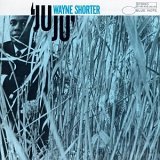Wayne Shorter - JuJu (1964)
 This album is a central document from perhaps the central year in the artistic development of Wayne Shorter. It was recorded in August 1964, as Shorter completed a term lasting nearly five years as a member of Art Blakey's Jazz Messengers. One month later, the tenor saxophonist joined Miles Davis for what proved to be an even lengthier tenure. This was also the year in which Shorter signed a Blue Note recording contract, and embarked on an intensive documentation of music under his own name that fans and followers considered long overdue.
This album is a central document from perhaps the central year in the artistic development of Wayne Shorter. It was recorded in August 1964, as Shorter completed a term lasting nearly five years as a member of Art Blakey's Jazz Messengers. One month later, the tenor saxophonist joined Miles Davis for what proved to be an even lengthier tenure. This was also the year in which Shorter signed a Blue Note recording contract, and embarked on an intensive documentation of music under his own name that fans and followers considered long overdue. Shorter's contributions to not one but two legendary editions of the Blakey band as both soloist and composer/musical director exceed those of any other Messenger save Horace Silver. Free For All and Indestructible, Blakey albums recorded for Blue Note earlier in 1964, remain memorable examples of his Blakey period from late in Shorter's stay. He also contributed to several earlier Messenger sessions, and to Blue Note dates led by Freddie Hubbard, Donald Byrd, and Lee Morgan; but prior to 1964, Shorter's own recordings were surprisingly few in number. Before his Blue Note debut Night Dreamer was issued, Shorter's name had appeared on only two Vee Jay albums. That label's The Young Lions (a prescient title in more ways than one) might also be considered a Shorter date, given the prominence of his compositions; yet it, like most of Shorter's other studio appearances to that point, placed him in an ensemble with other horns. We now know that a Shorter quartet album had been cut in 1960, so "JuJu" is not chronologicaly his first work with such a rhythm section. It was the first to appear, however, which made this second Blue Note release a particularly revealing portrait.
The personnel Shorter enlisted for the album and the sound of the music they created makes consideration of the John Coltrane quartet so inevitable that the absence of reference to Coltrane in Nat Hentoff's liner notes must have been intentional. While he stressed the working relationship of Shorter and Workman, Hentoff might have added that Tyner and Jones had served in Coltrane's band almost as long as Shorter had in Blakey's, and that -before Jimmy Garrison became the bassist identified with classic Coltrane quartet music- Workman had filled the group's fourth slot. Several compositional elements employed by Shorter, including the triple meter of the title track and the harmonic suspensions on "Mahjong" and "Yes or No", had been popularized by Coltrane's group, while the size and urgency of Shorter's sound recalls Coltrane as well. Yet Shorter brought his own slant to bear, just as he put a different spin on Blakey's music than his predecessors in that band had provided. The pithiness of Shorter's expression, its combination of boldness and vulnerability, and the similar juxtaposition of structural sophistication and melodic directness in the writing signal the emergence of a truly unique style, one issuing from a mind that is highly analytical yet suffesed with the fantastic.
At this point, that style was clearly based in ideas that this particular rhythm section understood quite well. The music fits Tyner and Jones perfectly, especially in the pendular motion of several pieces, and one is hard pressed to imagine even so magnificent a trio as the Hancock/Carter/Williams unit of Miles Davis's quintet playing "JuJu" or "Mahjong" as effectively. Tyner, bursting with ideas throughout, takes dramatic advantage of his position as opening soloist on several tracks. Jones is power personified, and his complex polyrhythms are beautifully recorded. Both musicians add further evidence for the propositions that; great players who were recorded by several engineers sounded better when Rudy Van Gelder was engineering, and great players who recorded at Van Gelder Studios for several labels sounded best when Alfred Lion was producing. Above all, though, the band serves Shorter's vision, and it is just as easy to hear intimations of the saxophonist's future as any allusions to another ensemble's present. For two examples, note how "Deluge" anticipates "Tom Thumb" and the uncommon beauty that links "House of Jade" to "Infant Eyes".
As has been the case on several Blue Note sessions, compact disc technology allows the release of alternate takes, and the two heard on the latest RVG Edition version of this album are strong performances. The alternate "JuJu" is a model of urgency tempered by lyricism, though it lacks the abandon that ultimately makes the original master superior. On the other hand, the relaxed air of the alternate "House of Jade" creates a distinct aura that strikes this listener as more effective than that informing the more deliberate master.
No comments:
Post a Comment